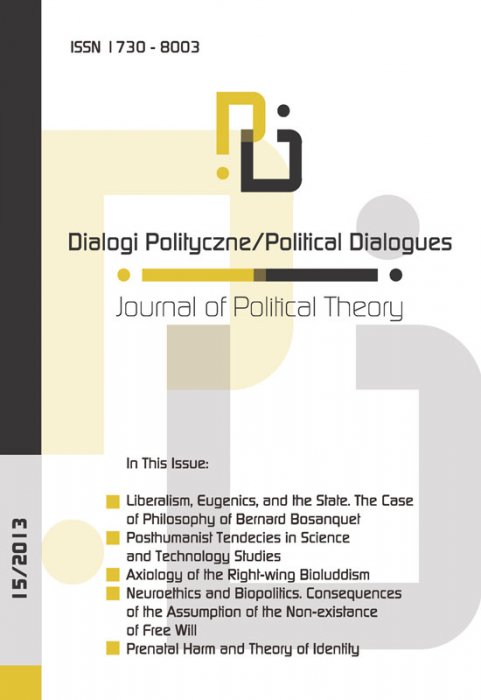Posthumanist Tendencies in Science and Technology Studies
DOI:
https://doi.org/10.12775/DP.2013.001Słowa kluczowe:
Posthumanism, Science and Technology Studies, Actor-Network Theory, postconstructivism, non-human agency, modern systemic risk, political/ecological criticism of anthropocentrismAbstrakt
The article discusses posthumanist tendencies occurring in the so-called Science and Technology Studies (STS), concentrating mainly upon B. Latour’s Actor-Network Theory (ANT). Postconstructivist conceptions within STS emphasize the crucial role of material situatedness of technoscience that is dependent on non-humans in laboratory practice (allowing
to extend and “delegate” cognitive capacities to the environment). What is more, ANT accepts the radical thesis of
non-human agency. The text also analyses a larger posthumanist political trend present in STS and in other theories, rejecting the arrogance It emerges as an inevitable reaction towards the problem of possible ecological destabilization (modern systemic risk or axiological/political challenges created by the so-called “wet” technologies, such as biotechnology, biomedicine, pharmacology).
Bibliografia
Andorno R. (2004). The Precautionary Principle: A New Legal Standard for a Technological Age, “Journal of International Biotechnology Law”, No. 1, p. 11-19.
Beck U. (1992). Risk Society: Towards a New Modernity, SAGE, New Delhi.
Beck U. (1995). Ecological Politics in the Age of Risk, Polity Press, Cambridge.
Bińczyk E. (2010). Conceptualizing Technoscience in a Reasonable, Constructivist Way, [in:] V. Munz, K. Puhl, J. Wang (eds.), Language and World. Part Two. Signs, Minds and Actions. Proceedings of the 32th International Wittgenstein Symposium, Ontos Verlag, Frankfurt, Paris, Lancaster, New Brunswick, p. 227-234.
Bińczyk E. (2013). Thinking about the Role of Laboratories Today. Anti-essentialism, Macro-ethics and Participatory Turn, in: H. Greif, M. Weiss (eds.), Ethics – Society – Politics, Proceedings of the 35th International Wittgenstein Symposium. Berlin, Boston: De Gruyter Ontos, p. 519-530.
Bińczyk E. (2013a). (Post)constructivism on Technoscience, „Avant”, Vol. IV, No. 1, p. 317-338.
Bostrom N. (2005). In Defence of Posthuman Dignity, “Bioethics”, Vol. 19, No. 3, p. 202-214.
Bostrom N., Savulescu J. (ed.). (2009). Human Enhancement, Oxford University Press, New York.
Clynes M. E., Kline N. S. (1960). Cyborgs and Space. Astronautics, [in:] C. H. Gray H. J. Figueroa-Sarriera, S. Mentor (eds.), The Cyborg Handbook, Routledge, London & New York, p. 30-31.
Crutzen P. J., E. F. Stoermer (2000). The ‘Anthropocene’, „Global Change Newsletter”, No. 41, p. 17-18.
Derrida J. 2002. The Animal That Therefore I Am (More to Follow), ”Critical Inquiry”, No. 2, 49-77, trans. D. Willis.
Derrida J. 2003. And Say The Animal Responded?, [in:] C. Wolfe (ed.), Zoontologies: The Question of the Animal, University of Minnesota Press, Minneapolis, trans. D. Willis.
Giere R. N., Moffat B. (2003) Distributed Cognition: Where the Cognitive and the Social Merge, “Social Studies of Science”, Vol. 33, No. 2, p. 301-310.
Fukuyama F. (2002). Our Posthuman Future. Consequences of the Biotechnological Revolution, Farrar, Strauss, Giroux.
Habermas J. (2003). The Future of Human Nature, trans. H. Beister, W. Rehg, Polity Press, Cambridge.
Hacking I. (1992). The Self-Vindication of the Laboratory Sciences, [in:] A. Pickering (ed.), Science as Practice and Culture, University of Chicago Press, Chicago, p. 29-64.
Hacking I. (2000). The Social Construction of What? Harvard University Press, Cambridge, Mass.
Haraway D. J. (1994). A Game of Cat’s Cradle: Science Studies, Feminist Theory, Cultural Studies, “Configurations”, Vol. 2, No. 1, p. 59-71.
Haraway D. J. (2003). The Companion Species Manifesto: Dogs, People, and Significant Otherness, Prickly Paradigm Press, Chicago.
Haraway D. J. (2008). When Species Meet, University of Minnesota Press, Minnesota.
Harris J. (2007). Enhancing Evolution. The Ethical Case for Making Better People, Princeton University Press, Princeton.
Hughes J. (2004). Citizen Cyborg: Why Democratic Societies Must Respond to the Redesigned Human Future, Westview Press, Cambridge, Mass.
Knorr-Cetina K. (1981). The Manufacture of Knowledge: An Essay on the Constructivist and Contextual Nature of Science, Oxford: Pergamon Press.
Knorr-Cetina K. (1995). Laboratory Studies. The Cultural Approach to the Study of Science, [in:] S. Jasanoff, G.E. Markle, J.C. Petersen, T. Pinch (eds.), Handbook of Science and Technology Studies, SAGE, London, New Delhi, p. 140-166.
Latour B. (1986). Visualization and Cognition: Thinking with Eyes and Hands, „Knowledge and Society”, No. 6, p. 1-40.
Latour B. (1987). Science in Action: How to Follow Scientists and Engineers Through Society, Harvard University Press, Cambridge, Mass.
Latour B. (1991). Technology is Society Made Durable, [in:] J. Law (ed.), A Sociology of Monsters: Essays on Power, Technology and Domination, Routledge, London, p. 103-131.
Latour B. (1997). Where Are the Missing Masses? The Sociology of a Few Mundane Artifacts, [in:] W. E. Bijker, J. Law (ed.), Shaping Technology/Building Society. Studies in Sociotechnical Change, MIT Press, Cambridge, Mass., London, second edition, p. 225-258.
Latour B. (1999). Pandora’s Hope. Essays on the Reality of Science Studies, Harvard University Press, Cambridge, Mass.
Latour B. (2004). Politics of Nature. How to Bring the Sciences into Democracy, trans. C. Porter, Harvard University Press, Cambridge, Mass., London.
Pepperell R. (1995). The Posthuman Condition: Consciousness Beyond the Brain, Intellect Books, Oxford.
Pickering A. (ed.). (1992). Science as Practice and Culture, University of Chicago Press, Chicago.
Pickering A. (1995). The Mangle of Practice: Time, Agency and Science, University of Chicago Press, Chicago, London.
Rifkin J. (1983). Algeny: A New Word, A New World, Viking, New York.
Sandel M. (2007). The Case Against Perfection, Belknap Press, Cambridge, Mass., London.
Sismondo S. (2010). An Introduction to Science and Technology Studies, Wiley-Blackwell, Malden, MA, Oxford, second edition.
Smith B. H. (2004). Animal Relatives, Difficult Relations. “Differences”, No. 1, p. 1-23.
Winner L. (1986). Do Artifacts Have Politics?, [in:] The Whale and the Reactor: a Search for Limits in an Age of High Technology, Chicago University Press, Chicago, London, p. 19-39.
Wolfe C. (2009). Human, All Too Human: “Animal Studies” and the Humanities, “PMLA”, Vol. 124, No. 2, March 2009, p. 564-575.
Wolfe C. (2010). What Is Posthumanism?, Posthumanities Series, No. 8, University of Minnesota Press, Minneapolis.
Pobrania
Opublikowane
Jak cytować
Numer
Dział
Statystyki
Liczba wyświetleń i pobrań: 642
Liczba cytowań: 0



